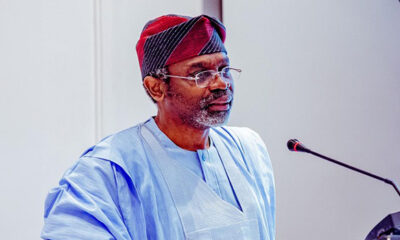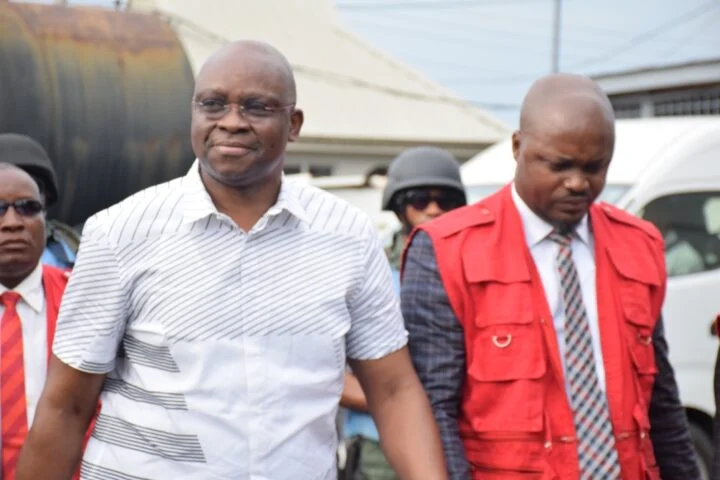Badagry, one of the five traditional divisions of Lagos State reaped bountiful dividends of the development programmes of the Babajide Sanwo-Olu administration.
A 110-bed Maternal and Childcare Centre (MCC), School of Anaesthesiology in Badagry General Hospital, and 252 units of a two-bedroom housing project in Idale; all completed and delivered in the ancient town by Governor Sanwo-Olu.
On Saturday, the boundary town literally stood still for the formal inauguration of the projects, as residents and traditional rulers, led by the Akran of Badagry, trooped out to receive the Governor, his deputy, Dr. Obafemi Hamzat, and members of their entourage.
Besides, Sanwo-Olu flagged off the construction of the 5.5 kilometer-long Hospital Road being rehabilitated to create easy access to the Badagry General Hospital and the new housing estate in the town.
The Governor said the projects were part of his administration’s efforts to bring development in Badagry at par with other areas of the State. With the completion of the four-floor MCC, which is already being operated, Sanwo-Olu said the State Government had expanded healthcare infrastructure and improved access to quality health services in the town.
“Today’s commissioning activities are in fulfillment of part of the promises we gave our citizens in Badagry and I am delighted to be inaugurating three key projects that will enhance standards of living and boost the development of human capital, particularly the 110-bed MCC we have completed in this part of Lagos.
“This is just a testimony to our assurance to the people and our commitment to deliver quality projects that will turn around the lives of our citizens. Not only the MCC we are handing over for public use today has an emergency service, but it also caters to obstetrics and gynecology. There are also a laboratory, radiology, pediatrics and immunization departments.”
The Governor said the rehabilitation and expansion of the School of Anaesthesiology in the Badagry General Hospital were aimed at increasing the number of trained professionals in the field. He said such pivotal projects were being replicated in other locations across Lagos.
He said: “The people of Badagry and the adjoining communities now have increased access to quality and safe healthcare, and reduction. This will bring about the complete eradication of maternal and infant mortality, as well as a general improvement in all maternal and child health indices in this local government. All these benefits will, in turn, have a positive ripple effect on the development and socio-economic indices of Badagry.”
Commissioner for Health, Prof. Akin Abayomi, said the Badagry MCC was immediately activated for operation after its completion last November, disclosing that the facility had already delivered healthcare services to over 3,000 outpatients and 600 children. The facility, the Commissioner said, has taken 49 successful cesarean deliveries.
The MCC, Prof. Abayomi noted, would complement the capacity of the 21 primary healthcare facilities across the three Local Government Areas (LGAs) in the Badagry axis.
Sanwo-Olu said the State Government acknowledged the effect of affordable housing on the socio-economic wellbeing of the residents, which was why his administration went into a joint partnership with a private investor, Echostone Development Nigeria Ltd, to deliver the 252-unit two-bedroom terrace bungalows for low- and middle-income families.
The housing project was designed with eco-technology and EDGE Advanced protocol, which is a green building certification that making buildings to be more resource-efficient.
Sanwo-Olu said the same technology would be employed to build the proposed Workers’ Village in Ipaja later in the year. This scheme, he said, will provide 600 affordable housing units to workers and their families.
He said: “The 252 units of two-bedroom terrace bungalows being commissioned today incontrovertibly proved our sincerity about closing the housing deficit and delivering our housing promises through the relationship we have cultivated with the private sector for housing development. This Idale-Whedako Scheme is indeed a direct result of our faith in the capacity of the private sector to play a supportive role in housing development.
“This housing scheme has come with the lowest of prices, which makes it affordable to the targeted population. The payment plan will be spread over a longer period of time. I thank our development partner, Echostone Development Nigeria Ltd, for supporting the State Government in this regard.”
Commissioner for Housing, Hon. Moruf Akinderu-Fatai said the housing project was uniquely designed and came with the convenience of low-cost maintenance in terms of water usage and energy efficiency.
He added that the project had security and comfort features, such as streetlights, water treatment plant, central sewage treatment plant, strong perimeter fence, and good road network.
“No doubt, the housing scheme has added great environmental and economic value to Badagry community,” Akinderu-Fatai said.
Governor Sanwo-Olu took about a 1.17-kilometer road walk with Badagry residents to flag off the reconstruction of the decrepit Hospital Road that connects the city center to the Badagry General Hospital.
While declaring the project open, the Governor noted that the project would be expanded to a double carriageway and will be done in two phases, with the first phase spanning 3.2-kilometers.
The second phase is 2.3 kilometers and it will commence immediately after the completion of the first phase.
Sanwo-Olu said: “This road construction flag off is a demonstration of our readiness to serve our citizens on this part and it doesn’t matter how long it takes. It doesn’t matter how far Badagry is from the State capital; we will never neglect this city in our development drive. We will continue to justify the confidence you reposed in us when you voted us in.”
The Hospital Road also links five communities- Idale, Akarakunmoh, Pivota, Topo, and Ajido – to Lagos-Badagry Expressway via Joseph Dosu Road.








 BIG STORY3 days ago
BIG STORY3 days ago
 BIG STORY2 days ago
BIG STORY2 days ago
 BIG STORY3 days ago
BIG STORY3 days ago
 BIG STORY5 days ago
BIG STORY5 days ago
 BIG STORY3 days ago
BIG STORY3 days ago
 BIG STORY2 days ago
BIG STORY2 days ago
 BIG STORY2 days ago
BIG STORY2 days ago
 BIG STORY5 days ago
BIG STORY5 days ago































